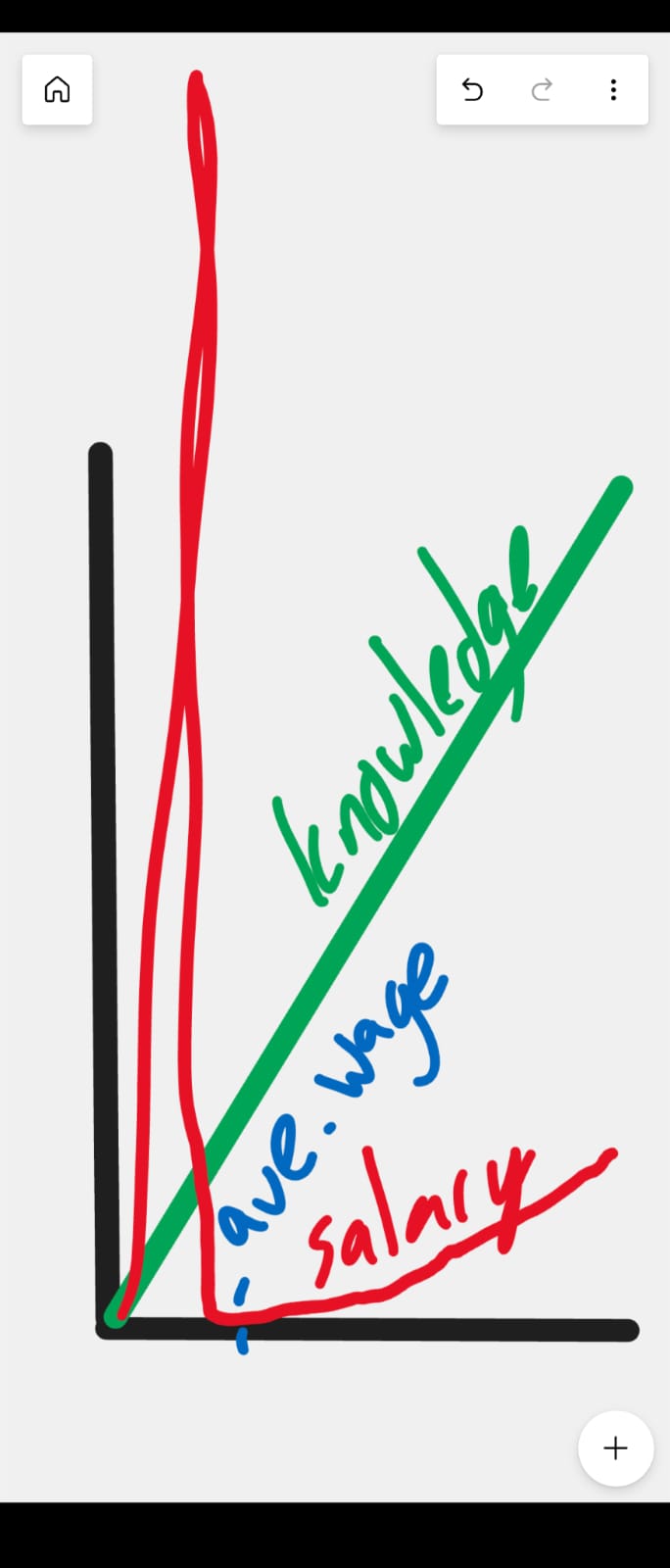So I’m 20 and I’ve started looking at the salaries of jobs/careers, and this is the impression I’ve gotten. Like that you could spend years cramming a ton of knowledge about a very niche field, and still only get 2-3x what a run-of-the-mill job makes. Is this true? If yes then I guess this route to wealth would only make sense (due to the diminishing returns) if the topic truly spoke to you, right? Are there alternative career paths to good pay than being really good at something really specific?
LABEL YOUR FUCKING AXIS AAAAAAAAAA
I can clear that up for you. The X axis is vibes and the Y axis is vibe dependent vibes.
I’m actually not sure how you’d label the axis here. The info being conveyed is the relationship between two separate things.
X would be hardness of job and y would be salary
After many careers and much money earned and spent, I now try to go by „ikigai“. Its a japanese theory and teaches you to be aware of what it is that you want, what makes you money, what the world needs and what you‘re good at, basically. This is how I went from a very well paid but soul sucking job to a lesser paid but much more fulfilling work.
For me it was building computers and the stuff around it. Its fun and it makes decent money if done right.
Good luck!
The amount of money you save (and invest) isn’t accurately depicted with this though. Living expenses don’t necessarily grow with take home, if you keep lifestyle creep to a minimum.
So what this means is that if you make $100k and save $10k/year, if you start making $200k you can save the same $10k/year, plus the entire additional $100k after taxes (let’s just say that’s $50k+). So you doubled your salary but your savings went up 6x+.
What are your x and y axes here?
Y is wage, X is experience. Green is just Y=x
So then what does the green line represent?
my understanding is the that green line represents the linear relation of salary to knowledge which OP would consider fair and just. therefore the part where red line is above the green one means people who earn below average are overpaid for their knowledge and professional contribution. and similarly, the part where the red line is below the green one means people who earn above average are underpaid
Yup! Well infered. My bad for not writing that in.
Y=x
The way I expected it to work when I was younger
X is years of experience , y is a combined axis, technical knowledge for the green line and salary for the red line
Salary really depends on value provided or enabled. That’s why more knowledge stops mattering at a certain point, someone with a month of experience driving a forklift is less valuable than someone with 3 years, but 6 years of experience isn’t significantly different.
There’s also benefits to being closer to money to show value. This is why sales jobs tend to pay better, as showing direct responsibility for 1 million in sales vs keeping the machines running that made the product.
I actually just got told something similar. In a resume was listed, “over 10 years of leadership/management experience” and the recruiter reviewed it and said, “i don’t care. I can find 20 other people within two minutes who have 10+ years of experience. Tell me what the skills are.”
Tenure in a position means very little. Every year is a diminished return of value.
There’s also benefits to being closer to money to show value
Ah that’s a good tip actually
Your graph is missing the more important factor: demand.
I’m guessing you weren’t born into money, which is what most ultra wealthy people do. So failing that, you need to cultivate a skillset which includes doing something that other people want and are willing to pay for. And yes, that often means learning specialized, or dangerous skills. Take something like a high voltage electrician, they can make good moeny but they need a specific skillset, certifications, and fucking up can mean dying very quickly. Construction divers or underwater welders can earn good money as well. Though again, specific skillsets, certifications, and risks. On the less risky side, programmers can make good money, though that usually does require a lot of learning. IT and cybersecurity also fit this bill, though they do tend to follow your graph.In short, businesses pay for people because they have a need for something to get done. No need, no money. You can be the most knowledgeable person in the world about flaking stone tools, and you are going to be struggling. Another route to income is starting your own business, but this has similar pitfalls. Start a business which people aren’t interested in and you’re going to flounder. Also, running a business does take it’s own skillset, beyond the skillset involved in whatever the business’s focus area is. Though, done right, you can focus on running the business and hire people to do the other stuff.
You are falling into a trap a lot of young, smart people do. You are assuming that knowledge and intelligence is what you need to succeed. It’s not your fault, you’ve been fed that line for the last 12-ish years of your life by schools and society. It’s bullshit. They do help, but knowing the right people, luck and the ability to socialize are more important. In short, go to business school and go into management. If that doesn’t appeal to you (and that is perfectly valid) then you need to find and learn skills that businesses are willing to pay for. At the moment, that probably means a trade, like electrician or welder; or, a technical role such as engineering, IT or programming. If your interest is in the Humanities, sorry you’re probably fucked.
Networking in university got me my first jobs and they were very good starting jobs.
I don’t mean you have to go out and be fake, but get involved in a bunch of stuff, and make sure to check if your department has any corporate relationships you can use.
Meeting people pays the best dividends in life.
Who you know, and the opportunities they afford is a game changer for career trajectory.
The big reason to pay money or get into a good school isnt that the education is of that much higher quality, its about who your friends are, and more importantly what their parents or parents friends do. You have a friend all through school and one day you are like ‘i wanted to get an internship somewhere but im not sure how to go about it’ and then your friend is like ‘oh my mum/dads friend is a senior manager/team leader at XY good company, im sure they can find you a placement.’But saying this, it is “who you know not what you know” until your in the job and its a matter of time until it becomes “what you know and who you know won’t save you”, except the rare circumstances where your working for dad in the whitehouse or something.
Meeting people pays the best dividends in life.
Mmm well said. That makes sense
You are falling into a trap a lot of young, smart people do. You are assuming that knowledge and intelligence is what you need to succeed.
Thank you for telling me this
IT and cybersecurity also fit this bill, though they do tend to follow your graph.
You’re right! These kinds of jobs were the ones I was initially looking at (the cliche that engineers make good money is true but you’re right, the diminishing returns do start to kick in)
Generally speaking, wealth is not built by working. It’s built by investing. It’s possible to have a relatively small salary and get relatively wealthy if you consistently live below your means and invest the surplus. Power of compounding.
Oh I see, I will keep this in mind. Yeah I suspected that any jobs that got you super good money were not because of the knowledge but because of playing the game/luck.
Is there a field where that red curve is flipped so that each extra aquired unit of expertise earns you exponentially more money?
Continuing to work for the same company will only provide +2% to +4% per year regardless of knowledge gained. You aren’t paid for how much you know.
To get the large gains in income, you have to re-set your salary by changing jobs, at which point you get one big bump, then go back to +2% to +4% per year.
To be honest, when you continue to work for the same company, your knowledge will also only grow by +2% to +4% per year.
You’ll be the go-to guy for a number of things, all of which you’ve done a thousand times. Doing something else will decrease the team’s efficiency, cause someone else is the go-to guy with the expert knowledge on that.
And you only work within the context of your company, without getting exposed to how other companies do things.It takes a certain soft skill to break out of one setting and hit the ground running somewhere else, which most don’t have. And after you switch, you bring a valuable outside view into whatever company you enter. That’s part of the reason you can demand more at a new workplace.
Staying for a long time in one place also offers comfort and familiarity, which have value for people, especially with families.
Employers need to pay more to make up for that loss in “value”.I’m one of those people that’s switched skill sets and jobs multiple times. It’s great for me because I love learning new things and using the new things I’m learning as it applies to the current job I’m doing. But there is a disadvantage to this in that recruiters don’t know what the hell to do with you and bosses are always suspicious that you will jump ship at the drop of a hat. The ones who do take a chance and hire me have always been happy with my work though.
Same boat here. A recruiter gave me the advice that staying at a company for less than 2 or more than 7 years sticks out and makes them suspicious.
If you switched after less than 2 years, how can they rely on you sticking with them?
If you switched after more than 7 years, are you flexible enough? And what actually forced you to switch now?
Not true for everyone. My pay rises over the past 5 years were around 35% on top of my starting wage, specifically linked to how much knowledge or experience I have gained in the role.
In curious where you are in the career curve?
When I started I had similar experience where I was rapidly getting promoted and raises. Eventually that slowed down.
I’m 42 and have been working in the same industry for 20 years. This is just a good company to work for.
I think I’m very much a generalist, but the areas in deep on I’m much deeper than others.
But that means as companies get bigger they want more specialists and i end up less valuable as I’m just filling in gaps.
Makes finding those good companies harder, but I’m more valuable to small companies than hiring 3-4 people, so I can command good pay.
Well, that’s great for you! Definitely not the norm though!
Or instead, form a union and demand better pay and retention incentives.
I see, it’s useful for me to know that it will work like this.
It’s hard to overstate how much money “2-3x what a run of the mill job makes” is over the course of a lifetime. I guess to you right now it doesn’t seem like much, but someone who makes three times more money than someone else is significantly more well off. There aren’t any wage jobs that are going to net you exponential salary growth. Your only hope there is to strike gold and found PayPal or Microsoft or something.
This is very true
Some people fall into the lifestyle creep trap and get accustomed to spending what they make. If you make 2x average and live relatively normally you’ll find your savings grow quick.
Even if you do make good money, it’s best not to let that go to your head.
To build on your comment: cost of living has a surprisingly fixed price. Different qualities of living don’t cost massively different. If the average person has to spend their whole earnings on living an “average life”, if you make 2x and want to live twice as nice of a life, it likely only cost 1.5x the “average life”. Earning 2-3x opens up a lot of luxury even though it may not seem like it.
I guess to you right now it doesn’t seem like much, but someone who makes three times more money than someone else is significantly more well off.
Oh I see. Ok I’ll keep that in mind.
Manipulativeness
Sales. No joke — the knowledge you need has a hard cap (the product line) but sales is commonly the highest-paid entry level employee (as long as you hit commission).
Now add a line in here for “effort” flattening out over time and that’s what I wanna see.
Trades. If you are a plumber or an auto mechanic you can make a killing. Doubly so if you own the business. If I had it to do over again I would get a business degree and then become an electrician.
When Epic started hiring every software engineer in video games they flipped that red curve, at least to the right of that blue line.
Con man? CEO? Hedge fund manager?
But seriously, generally anything having an exponential return in this world is pretty unusual and generally not guaranteed if it’s a desirable outcome.
Particularly in a capitalist economy, the business only has to pay you just enough to not leave for a competitor, they don’t need to pay you the true value of your ability unless you’re basically the only person on the planet with the necessary skills.
On the flip side, in booming industries that require specific skills such as tech, you can generally get a pretty linear progression for a while before it plateaus in a good number of organisations.
bullshitting other people
Corrupt politician.
The problem is you’re comparing labor to labor. Try owning property, that graph has exponential growth with no cieling, you know, like cancer.
You have a point, I guess I forgot to consider Playing The Game. And yeah, investing something off the side does sound like a good idea.
I don’t think there’s a strong relation between knowledge and salary. It’s more likely demand and supply - if specific skills are in demand, and not many people have them, then pay will increase. And at the highest levels it’s often not what you know, but who you know that matters.
Play around with this for a bit: https://networthify.com/calculator/earlyretirement?income=50000&initialBalance=0&expenses=20000&annualPct=5&withdrawalRate=4
Consider spending 30k yearly when you’re earning 50k. You can retire in about 20 years if you keep to that. You really gotta keep to it though, spending 40k means you’d have to work almost 40 years instead.
Now compare that to spending 30k when making 100k. Now you can retire in 9 years. Even if you have to spend literally twice as much time+effort doing so, you end up with more of your life leftover.
This is not to say that you should take a job you hate, but rather to say that making more money does make your life better, but only up to a point. If you find a job that you genuinely enjoy, great do that. If you’re picking between different things you dislike, translate it back into years instead of trying to understand it in made up funny money numbers. And when you get there, stop.
This is somewhat off topic, but it is actually related to knowledge, income, and returns.
I’m telling you from experience, make enough money to live comfortably and stop when you get there. If at all possible, don’t have a long commute. Don’t have a prestige job. Don’t have a position that requires OT or sprints. I deescalated my role to something more banal and my happiness went way up.
You’re likely not in a position to do that at 20, but when you get somewhat into a career and life sucks and you hate your work and you want to die, start looking for something that pays less but also doesn’t suck the life out of you.
Mmm yess this is my plan
I would have agreed with this chart a decade ago but not now. I recently quit being an systems engineer to being a high voltage electrician. My job stress and required knowledge went down considerably, my pay went up 2x. I would love to recommend school but cannot as I feel like it was a waste for my career path.
deleted by creator
Obviously ripoffs are the best money makers :-) But I’m not that kinda guy

This is my take on it. That unexpected spike in the salary is slightly skewed stats from the billionaires with all the money and none of the knowledge.
Then it goes back down to nearly 0 where most of our average wages actually are.
Source: My source is that I made it the fuck up, but it’s certainly what it feels like when you see the clueless assholes with money and power.











